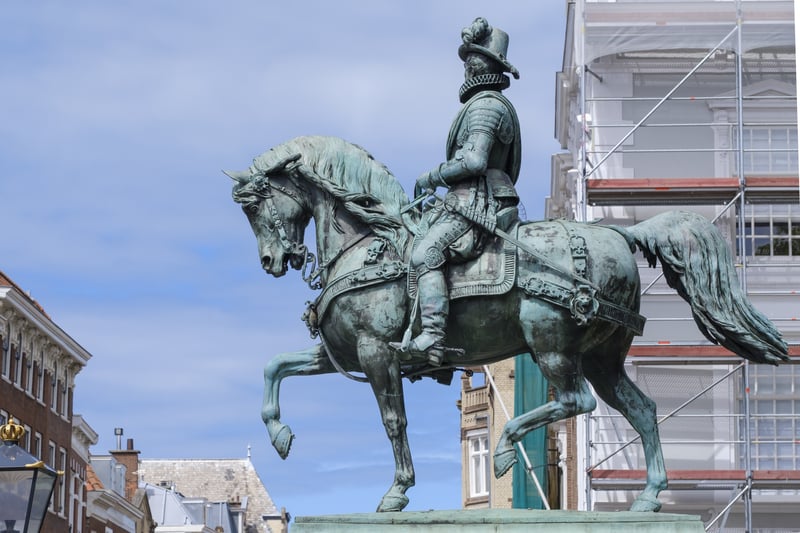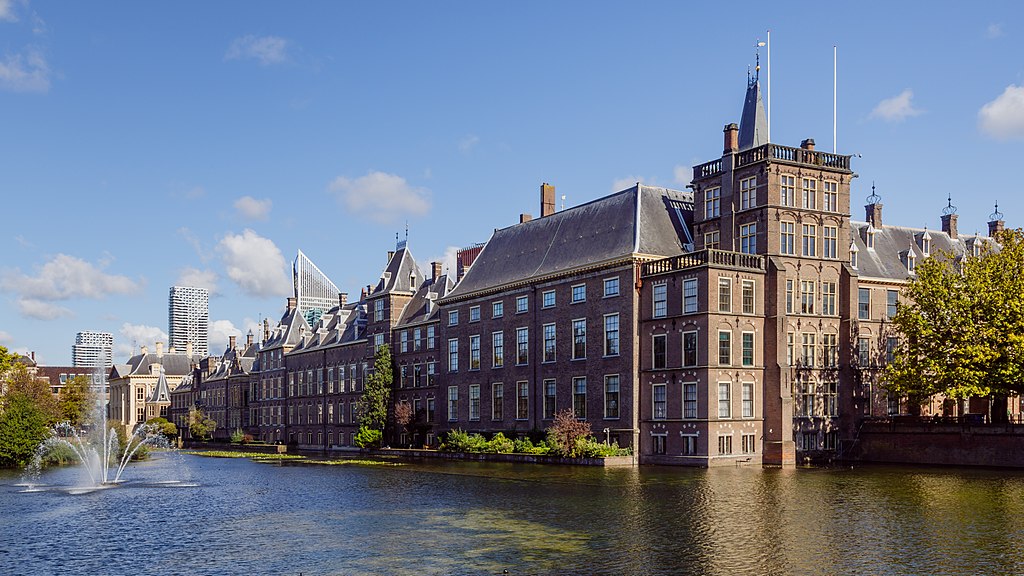You know that annoying sibling that you kind of hate but also absolutely love? Well, it turns out that same sentiment can apply to countries too.
If you’ve lived in the Netherlands for long enough, you’ve probably noticed this same love-hate relationship playing out between the Dutch and the Belgians!
Of course, a bit of friendly rivalry between countries isn’t unheard of (as a Dane, I’m looking at you, Sweden). But the question remains: why do two countries that share more than a few similarities — including a language — dislike each other so much?
Ultimately, it comes down to history, religion, and fries.
Shared history
Before getting down to the most important reason (fries, of course 😉), let’s have a look at some history.

The Southern Netherlands, *cough cough* I mean…Belgium
The shared history between the Netherlands and Belgium started way back in 1815. After the fall of Napoleon, the Congress of Vienna was charged with the tricky job of creating a balance of powers in Europe.
In an attempt to make neither France nor Prussia too strong, the area previously known as the Austrian Netherlands (hint: Belgium) was given to the newly founded United Kingdom of the Netherlands.
READ MORE | Amsterdam vs. London: a comparison of two capitals
For the coming decades, the new ‘Southern Netherlands’ was ruled under Prince Willem I — known widely as William of Orange.
Though we now thank him for the orange-mania that occasionally sweeps across the Netherlands of today, the Southern Nederlanders were not fans of the prince (nor his taxation policies or religious intolerance).
So, as was the custom in the 18th and 19th centuries, the people revolted in 1830.
The Belgian revolution
The revolution in itself was relatively short-lived.
By October 1830, revolutionaries had set up a provisional government and declared an independent Belgium. Now the only task was to figure out on what basis and by whom the new country would be governed — easy peasy!
READ NEXT | What would happen if Belgium joined the Netherlands (Video inside!)
The first step was grounding the new country in law. So, in February 1831, a Belgian constitution was adopted which declared Belgium to be a popular, constitutional monarchy.
After setting up to be a constitutional monarchy, the next step was to find a king (who was neither too Dutch nor too French 😅). Finally, on July 21, King Leopold took the throne, and the revolution was officially seen as complete.
Tadaaa! An independent Belgium…
‘So what?’
That was pretty much William of Orange’s response after the Belgians declared their independence.
In fact, he continued to wage war against the newfound country until the French said non more and intervened on the side of Belgium. William of Orange also refused to recognise the country until April 1839 — when he was forced to by the Treaty of London.
READ MORE | Dutch history hacked: 2500 years of Dutch life in 7 minutes (VIDEO INSIDE)
In short, Dutch-Belgian relations didn’t get off to a great start, but thankfully time has mended the shaky beginnings.
Today, international relations between the Netherlands and Belgium are strong — both countries are part of NATO, the EU, and the Benelux. Together, they’ve also created the Dutch Language Union.
However, just because the two countries enjoy a healthy relationship nowadays doesn’t mean history is forgotten. So, with a humorous nod to the tumultuous past, the Dutch and Belgian (still) love to hate each other.
What do the Dutch think of the Belgians?
Now that we’ve covered history, it’s time to talk about fries!
One of the dividing lines between the Netherlands and Belgium is whether fries should be called frietjes or patatjes. While (most) of the Dutch argue for friet, the Belgians are adamant patat fans.
Interesting as it may be, the Dutch and Belgian bantering does not end with this debate — in fact, there are a number of things the Dutch hold against the Belgians (and vice versa).
The Dutch hate Belgian roads
Firstly, the Dutch like to look down on the Belgians — especially their roads.
Venturing on a road trip to Belgium together with a Dutchie, you can expect at least a few comments about how the Belgian roads are “weird,” “bad,” etc.
While the intensity of comments will no doubt depend on the Dutchie you’re driving with, there’s actually something concrete to say about the difference in road quality!
In 2019, the World Economic Forum rated the Netherlands a 6.4 out of seven for their road quality, while Belgium only landed a 4.4.
The Dutch love to make fun of Flemish
Of course, Dutchies can’t leave it at roads alone. Something also has to be said about their “shared” language.
While Dutch is used in both countries, the Dutch spoken in Belgium is quite different — and the Dutch speakers from the Netherlands love to make fun of Flemish.
However, while they might make fun of it, many also think it sounds cute.
This could be because the Flemish pronounce the letter ‘g’ much softer than Dutch speakers — so if you’re struggling with the strong guttural ‘g’ sound in the Netherlands, be consoled that maybe you just sound Belgian. 😆
READ MORE | Going global: speaking Dutch (Flemish?) in Belgium
Other distinctions between Flemish and Dutch can be thought of as similar to the differences English speakers notice between British English and American English — pronunciation and some vocabulary sometimes differs.
The Dutch think Belgians are dumb
Ask a Dutch person about the Belgians, and you’ll most likely also hear that the Belgians are “dumb.”
Why? Honestly, I still haven’t figured it out (and I don’t think the Dutch really know either 😂), but most likely, it comes down to a good-natured sense of superiority.
Perhaps, it could also be the shadow of a grudge left from the Belgian revolution in 1830.
Or simply that the Dutch think Belgian governance would’ve been better off if the country had remained a part of the Netherlands rather than becoming a country with three different language regions.
Whatever the reason, it’s all in good sport, and the reality is that the average national IQ between the Netherlands and Belgium only differs by three points.

And whether or not that’s why Dutch people call Belgians dumb, one thing is for sure: the Dutch like to think their government is better organised, more efficient, and richer. (At least, that was until the governmental scandals in the past years — oopsies.)
What do the Belgians think of the Dutch?
That’s a lot of shade thrown towards the Belgians, so let’s see what they have to say about the Dutch.
The Belgians think the Dutch are stingy
Firstly, they agree with the rest of the world that the Dutch are stingy — because why pass up on a good stereotype, right? Certainly, the saying “going Dutch” is well-used around the world and could have a great deal to do with the stereotype.
READ MORE | 14 downright stingy things Dutch people do
And it’s not completely unfounded — just consider all those two euros Tikkie requests. However, the Dutch are not as stingy as they are frugal.
The difference is one of mindset.
Firstly, the Dutch are very Calvinist in nature, an ethos that played an important role in the shaping of Dutch identity throughout history — and contributed to making the Netherlands a rich country.
But the Calvinist tradition in the Netherlands is not all there is to a frugal mindset. Dutchies today also get more satisfaction from saving their money than people from other countries with similar economies.
Dutchies don’t (necessarily) go cheap because they are stingy, but because they firmly believe in the importance of living within your means and saving up for old age.
The Belgians think the Dutch are stubborn and arrogant
There’s also a notion among Belgians that the Dutch are arrogant and stubborn.
Mostly, this is the outcome of Dutch directness: something that doesn’t always go down well in Belgium, which is much more conservative.

The Belgians think of the Dutch as “cheeseheads”
Finally, it’s also not unheard of in Belgium to hear the Dutch being referred to as “cheeseheads.”
You might think the nickname makes sense considering that the Netherlands is world-famous for its cheese production and because a Dutch lunch would be incomplete without a cheese boterham.
READ MORE | The time Dutchies used cheese to defend themselves against the French
However, the explanation is much more interesting than this!
In fact, it’s thought that “cheeseheads” doesn’t refer to the Dutchies’ ability to produce the golden lactose goodness but to wearing helmets made from actual cheese vats. Yup, you heard that right.
During the time of Napoleon, Dutch cheese producers became fed up with French soldiers who’d steal their beloved Gouda.
In order to protect themselves when confronting the soldiers, Dutch farmers donned homemade helmets made from cheese barrels — et voila, cheeseheads!
Perhaps picking it up from the French, the Belgians then used “cheeseheads” as an insult during the Revolution.
You might have noticed that the Netherlands had a bit more to say about Belgium than the other way around but, as in all sibling-like relationships, one is always the bigger bully. 😉
Have you noticed any other aspects of this love-hate relationship between the Netherlands and Belgium? Tell us in the comments below!




Summary explanation about the Low Countries, the Netherlands, Belgium, Netherland/Nederland and New Netherland, Nieuw Netherlandt, Nova Belgica or Novum Belgium, Novi Belgii, etc. …
The plural ‘Netherlands’ comprised originally 17 provinces (i.e., the Low Countries or Netherlands) as part of the Habsburg Empire whereas the singular ‘Netherland’ comprised only seven rebellious provinces unilaterally united in 1581 as the Dutch Republic or the United Netherlands situated above the river Rhine (i.e., Belgium Foederatum – i.e., Federal Belgium.) The Republic sought to free all 17 Low Countries from Habsburg/Spanish authority/tyranny in an attempt to create one independent sovereign republic – a United Netherlands. Belgium was its Latin appellation.
Following 80 years of war with Spain since 1568, the Seven United Provinces were expanded just before the bilateral 1648 peace treaty with Spain by seizing below-the-river-Rhine portions of Vlaanderen (named today ‘Zeeuws-Vlaanderen’, thus controlling the river Scheldt that afforded access to the port of Spanish-held Antwerp and effectively blockading the port); the province of Brabant (now Noord Brabant); and Limburg with the strategically important town of Maastricht. The southern sectors remaining under Habsburg/Spanish authority were named Belgium Regium – i.e., Royal Belgium.
The original 17 Habsburg Low Countries were for the first time politically united as one independent sovereign state, i.e., the [plural] Netherlands, under a king, King William I, installed in 1815 by the Congress of Vienna following the end of Napoleon Bonaparte’s reign that ended in 1814. In 1806, Napoleon had installed his brother, Luigi Napoleone Buonaparte, king of the area that approximated the Dutch Republic and named it ‘the Kingdom of Holland’ (a client state of the French Empire.) He forced Luigi’s resignation as king in 1810. That year, the singular Netherland (under control of the French named ‘Holland’) ceased to exist and was annexed by France.
Since 1815 an independent monarchy, the 17 United Netherlands was split up again in a southern and northern portion in 1830 following a southern Netherlands rebellion supported by the French military. The southern section kept the original Latin appellation for ‘the Netherlands’, i.e., ‘Belgium’, and the northern section used the singular Dutch appellation ‘Nederland’ (i.e., Netherland.) This was confirmed in the bilateral Treaty of London in 1839. That is the way it still is.
However, the English language never adjusted for this new political reality after 1839 and continued to refer to singular Netherland as plural ‘Netherlands’: Idem ditto, the ‘now-royal’ House of Orange kept the plural form (i.e., King or Queen of the Netherlands) perhaps in anticipation of a future United Netherlands again. Such a cohesive vision for the Low Countries was partly accomplished in 1947 with the founding of a Customs Union named the Benelux (i.e., Belgium, Netherland and Luxembourg) and an expanded Economic Union to promote the free movement of workers, capital, services, and goods on 1 November 1960.
Maria, de vrouw van Jan van Riebeeck was van Belgische nationaliteit. De Nederlandse Colonialist is niet zo erg meer bemind in Zuid-Afrika. Tijden en meningen veranderen snel. Onlangs is een windmolen gebouwd in de Kaap gedurende daardie periode in tijd afgebrand in een protest actie. Het zijn niet net de Belgen die niet zo verliefd zijn op de leuke kaaskoppen, maar ook vele Zuid Afrikaners.
The Hollanders didn’t always like Willem van Oranje. At one time they were protesting saying to him: WWWWWWWWWWWW meaning : Wij Willen Willem weg, Wilde Willem Wijzer Wezen, Wij Willen Willem Weer.
The writer seems to ignore that in a territorial dimension sense, the larger part of Belgium (as well as its capital, Brussels) is Wallonia, which is nearly 100% French-speaking and would certainly NEVER look favorably to becoming part of the Netherlands (and probably not of France either). Many Dutch people vacation in Wallonia because the region has hills and Holland doesn’t, so they think they are in the Alps. However, they are mostly unwelcome by the locals because thry spend as little money as possible, bringing their own food (mostly awful anyway) even if they stay for a couple of weeks, and when they visit a cafe, the story is that they order a bucket of tap water, to which they add their own flavoring powder and as many straws as there are folks in the party.
As a child from a Dutch parent from above the Rhine and another parent from Flanders and with children myself going to French speaking schools I think the assimilation is complete.
That’s funny about the friet vs patat thing. My daughters, born and raised in the province of Zuid-Holland, call them patat while I call them friet (I’m neither Dutch not Belgian, but have lived in this part of The Netherlands for over 30 years). In fact, north of the main rivers it’s called patat and south it’s friet. I’m very certain the Belgians called them friet as well. Many of the Belgian Flemish words are derived from French, hence friet from frites.
he kinda messed that up cause it’s actually the other way around, but as he mentioned he is Danish so… and to be honest who cares what they are called many languages use different words for naming something kinda normal with different languages dialects and slangs i guess. For me it’s more important to respect one and other then what name to use for what food. 😉
Flemish don’t say patat for fries, it’s frieten or frietjes. Some Dutch do and it sounds rude. Flemish may use patat for patato, not for fries.
I think the article when describing the Dutch is actually describing people from Randstad – they hard G pronunciation, their Calvinistic nature and religion, their directness their use of “patat” for fries… Get out of Randstad and you’ll see that people are friendly not blunt, they eat their frietjes and they love their bourgoundisch life style. So yeah. It’s not only about their sense of superiority of the Hollanders towards the Belgian but also the Hollanders towards the rest of the country.
Honestly, this article is pretty flawed.
Firstly, the history is quite wrong. Well, most of it is factual, but there’s one major flaw here: William of Orange was mixed up with King William I. William of Orange lived in the 16th century, being the Founding Father of the Netherlands. King William I, on the other hand, is the person who is referred to here; a distant descendant of William of Orange, but a completely different person.
Secondly, it’s the Dutch that call ‘fries’ “patat” and the Belgians call them “friet”.
Thirdly… This is not as much pointing out a flaw as it is adding on… Nobody really knows why we make fun of the Belgians or why we think they’re dumb. It’s just all good-natured jabs. No real harm meant.
Thank you so much for all of this information.
I am born in Belgium but have only lived there for 6 years, can’t speak any Dutch/Flemish or French. All I can say is Belgium has the best beer in the world and know that people who speak Dutch/Flemish are more likely to know how to speak English. French speaking Belgians are not fun to be around. Just my observation having visited both of the countries on several occasions. Also, the Frites in Belgium are overrated.
You are right my friend although i love eating fries, i know a lot of us Belgians are more likely to eat lots of the foreign food variations we have here, with the many different cultures living in Belgium. There is nothing i enjoy more then trying out new food except for the insects, can’t seem to get myself to try these although many people claim they are good.